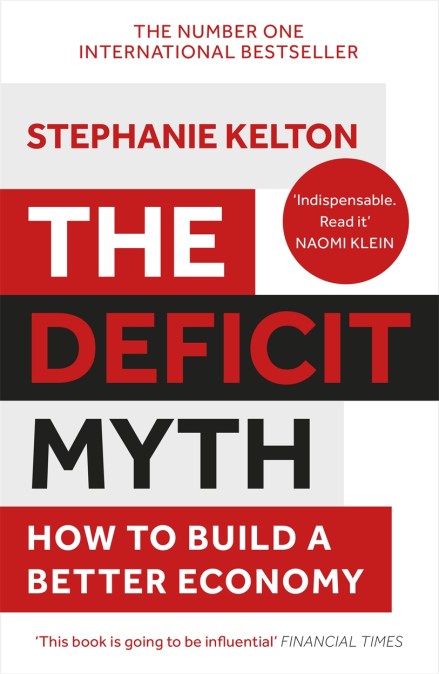The Deficit Myth
On sale
9th June 2020
Price: £12.99
THE INTERNATIONAL BESTSELLER
‘Kelton has succeeded in instigating a round of heretical questioning, essential for a post-Covid-19 world, where the pantheon of economic gods will have to be reconfigured’ Guardian
‘Stephanie Kelton is an indispensable source of moral clarity … the truths that she teaches about money, debt, and deficits give us the tools we desperately need to build a safe future for all’ Naomi Klein
‘Game-changing … Read it!’ Mariana Mazzucato
‘A rock star in her field’ The Times
‘This book is going to be influential’ Financial Times
‘Convincingly overturns conventional wisdom’ New York Times
Supporting the economy, paying for healthcare, creating new jobs, preventing a climate apocalypse: how can we pay for it all? Leading economic thinker Stephanie Kelton, shows how misguided that question is, and how a radical new approach can maximise our potential as a society. Everything that we’ve been led to believe about deficits and the role of money and government spending is wrong. Rather than asking the self-defeating question of how to pay for the crucial improvements our society needs, Kelton guides us to ask: which deficits actually matter?
‘Kelton has succeeded in instigating a round of heretical questioning, essential for a post-Covid-19 world, where the pantheon of economic gods will have to be reconfigured’ Guardian
‘Stephanie Kelton is an indispensable source of moral clarity … the truths that she teaches about money, debt, and deficits give us the tools we desperately need to build a safe future for all’ Naomi Klein
‘Game-changing … Read it!’ Mariana Mazzucato
‘A rock star in her field’ The Times
‘This book is going to be influential’ Financial Times
‘Convincingly overturns conventional wisdom’ New York Times
Supporting the economy, paying for healthcare, creating new jobs, preventing a climate apocalypse: how can we pay for it all? Leading economic thinker Stephanie Kelton, shows how misguided that question is, and how a radical new approach can maximise our potential as a society. Everything that we’ve been led to believe about deficits and the role of money and government spending is wrong. Rather than asking the self-defeating question of how to pay for the crucial improvements our society needs, Kelton guides us to ask: which deficits actually matter?
Newsletter Signup
By clicking ‘Sign Up,’ I acknowledge that I have read and agree to Hachette Book Group’s Privacy Policy and Terms of Use
Reviews
One of the most important and accessible books ever written about money
A remarkable book both in content and timing. A 'must read' that is sure to influence many aspects of policymaking going forward
Kelton is to modern monetary theory what Milton Friedman was to American conservatives for a half century - conversational, fierce, relentless.
Kelton's game-changing book on the myths around government deficits is both theoretically rigorous and empirically entertaining. It reminds us that money is not limited, only our imagination of what to do with it. After you read it you will never think of the public purse as a household economy again. Read it!
In a world of epic, overlapping crises, Stephanie Kelton is an indispensable source of moral clarity ... the truths that she teaches about money, debt, and deficits give us the tools we desperately need to build a safe future for all. Read it - then put it to use.
The best book on rethinking economics that anyone will find right now.
In the wake of the financial impact of the coronavirus, she's having a moment ... she's become a rock star in her field.
Kelton is a razor-sharp writer ... smashing shibboleths of conventional economic wisdom.
This book is going to be influential.
Kelton's book achieves a revolution in political economy.
A leading light in modern monetary theory.
[Kelton] has succeeded in instigating a round of heretical questioning, essential for a post-Covid-19 world, where the pantheon of economic gods will have to be reconfigured.
Convincingly overturns the conventional wisdom that federal budget deficits are somehow bad
The most talked about economics book of 2020

